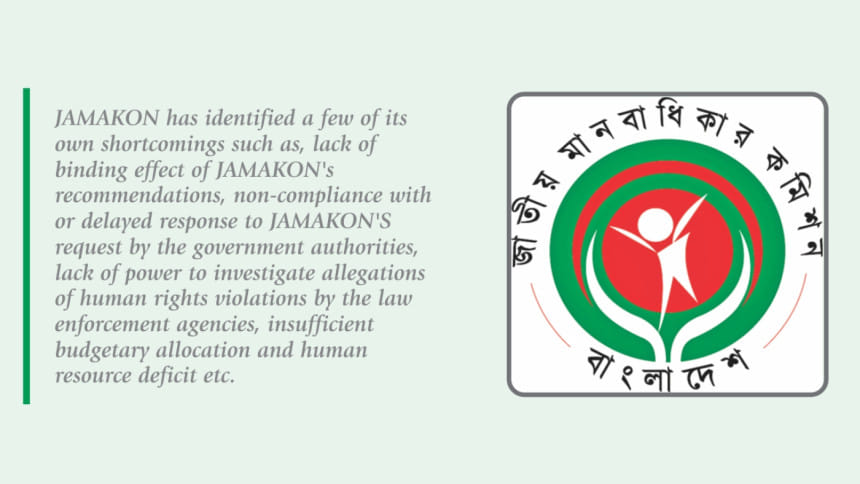Why JAMAKON deserves constitutional status?

The term, 'human rights' appears twice in the Constitution of Bangladesh. Although the Preamble and Article 11 of the Constitution provide that human rights will be guaranteed for the citizens of Bangladesh, until recently the term, human rights could not have gained much currency in our jurisprudence. In fact, 'human rights' remained overshadowed by 'fundamental rights' which basically include certain constitutionally guaranteed civil and political rights. The sole focus on fundamental rights has somewhat resulted in a narrower appreciation of human rights.
However, with the enactment of the National Human Rights Commission Act, 2009 (the NHRC Act) purportedly based on the Paris Principle, human rights got breakthrough as a legal term of functional importance in the legal system of Bangladesh. The said Act provides for establishment of the National Human Rights Commission, Bangladesh (JAMAKON) with a mandate to carry out a broad spectrum of activities for the purpose of promotion and protection of human rights. Although JAMAKON has been accredited with a 'B' status in a short while, it has been felt that JAMAKON is unable to live up to the expectations of the all concerned.
Whilst ordinary people have often voiced their expectations for a vibrant, venerable and robust Human Rights Commission capable of defending human rights in any situations in the face of any undue pressure, JAMAKON has identified a few of its own shortcomings such as, lack of binding effect of JAMAKON's recommendations, non-compliance with or delayed response to JAMAKON'S request by the government authorities, lack of power to investigate allegations of human rights violations by the law enforcement agencies, insufficient budgetary allocation and human resource deficit etc.
In the circumstances, on 21 October 2013 a round-table discussion was held on the reform of the NHRC Act with the participation of intellectuals, government officials, NGO personnel, social workers, students and ordinary people. The suggestions proposed at the said round-table discussion include reforms concerning composition of JAMAKON, designation/emolument of its Chairman and Commissioners, powers and functions of JAMAKON, financial freedom etc. It deserves mention that International Coordinating Committee for NHRIs (ICC) has also recommended for similar reform of the NHRC Act.
JAMAKON first and foremost needs constitutional status which will solve many of the issues already mentioned above. An obvious reason is constitutional status, if accorded to JAMAKON, will not only signify the State's commitment to human rights but also turn the Commission into a robust institution, and ensure its institutional autonomy.
First of all, how much importance the State actually attaches to human rights could be legibly inferred from the status and prestige of its national human rights institutions. In Bangladesh context, the term 'Commission' itself does not indicate any hierarchical superiority; rather it refers to a diverse array of legal entities assigned with equally diverse types of functions. As an autonomous statutory entity, JAMAKON is just one among many commissions currently functioning in Bangladesh. Therefore, conferment of constitutional status on JAMAKON will certainly elevate its prestige in everybody's eyes including the machineries of the government. Bestowing constitutional status on JAMAKON would dispatch a strong message as to how the government views the importance of human rights. This will help raise human rights awareness among the people at large. Furthermore, constitutional status will help JAMAKON to gain more efficacy, competence and overall influence.
JAMAKON has the most diverse nature and range of works to perform. JAMAKON is simultaneously a research institute, a law reform commission, a policy advocacy forum, an event manager, an investigation agency etc. To be precise, JAMAKON's mandate is so extensive that it is actually many Commissions under one name. The myriad of functions envisaged for JAMAKON leaves virtually no one out of its scope of work – whether living, dead or unborn, whether citizens, non-citizens or aliens, whether empowered or marginalised, whether residing in or outside Bangladesh and so on.
In this respect, one must not forget that actualisation of JAMAKON's works, however valuable and instrumental they might be, ultimately depends on how genuinely they are appreciated and acted on by the mainstream government machineries. Since in Bangladesh the authority and influence of an institution comes from its position in the hierarchy, constitutional status will equip JAMAKON with greater leverage so as to command better co-operation from the concerned government authorities.
And finally, constitutional status will not only safeguard but also confirm the autonomy of JAMAKON. The Constitution provides that the highest echelons of the Public Service Commission and the Election Commission cannot be removed from office except in like manner and on the like grounds as a Judge of the Supreme Court. Much as the NHRC Act extends similar safeguard to the Chairman or any Member of the Commission, such safeguard is not certainly on a par with constitutional guarantee for the simple reason that an Act of Parliament is susceptible to amendment or may be repealed by another parliamentary legislation, or even by an executive enactment known as 'Ordinance'. Suffice to point out that, an NHRI safeguarded by constitution would not feel daunted in the face of unfavourable gestures of the government.
In order to transform the fundamental rights discourse into the human rights discourse, there is no alternative to a strong and vibrant National Human Rights Commission. All the reform proposals made would serve better only if JAMAKON is accorded constitutional status.
The writer is an Advocate, Supreme Court of Bangladesh.

 For all latest news, follow The Daily Star's Google News channel.
For all latest news, follow The Daily Star's Google News channel. 



Comments